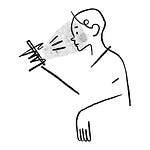(Bonus points if you get this episode title’s reference…) We all have to do it, and even many of the super-wealthy still choose to do it — clearly, it’s not just about bringing home a paycheck. But why bother working well? How do we find meaning in the thing we spend a whole heckuva lot of our waking hours doing? It goes far beyond holding a title of significance or having some surface form of influence.
Seth: Website | Newsletter | Twitter | Instagram
Tsh: Website | Newsletter | Twitter | Instagram
Shirt of Flame: A Year with St. Therese of Lisieux, by Heather King
"Against Decoration," by Mary Karr (reprinted in Viper Rum)
WandaVision on Disney+
Pay what you want for Tsh’s audio workshop, Create Your Rule of Life
Check out all Rothy’s shoes, bags, and masks available right now at Rothys.com/FRIEND.
Scroll down for the transcript.
Tsh: This is A Drink with a Friend, I’m Tsh Oxenreider.
Seth: And I’m Seth Haines.
Tsh: Alright, Seth. We’re going to be talking about the idea of legacy and vocation and work. Before we get into it, tell me what you’re drinking.
Seth: You know I’m really fond of Onyx Coffee. We’ve talked about this once or seventy times. The thing about Onyx Coffee, and I love the owners, they’re amazing people. They are doing amazing things for our community. But the thing is that if I drink it for every cup of coffee, I would go just flat-busted. I can’t do that. I can’t just drink Onyx as much as I would like. Today I have opted instead for a delightfully proletariat roast, I’ll put it that way, from Aldi supermarket.
Tsh: Perfect.
Seth: It’s their donut blend.
Tsh: Nice.
Seth: That should tell you how blue-collar I’m rolling today.
Tsh: I love it. That’s so good. We’ve had this phrase that we’ve had since our trip around the world which is when everything’s awesome, nothing’s awesome. That speaks into that idea, I think. If you drink the good stuff too much, you lose the taste for it, which sounds so snobby. I don’t mean it in such a bougie way. It’s not necessary all the time so that when you have it, it’s great.
Seth: And you lose that sort of treat mystique to it. That’s what I’m drinking today. What are you drinking today?
Tsh: I’m drinking actually a similar type of coffee, it’s a Honduras blend from the grocery store HEB because, slim pickings man. We don’t have a lot in our grocery stores right now after snowpocalypse last week. We get what we get. We don’t throw a fit.
Seth: That’s great. I feel like we should reach out to HEB and maybe consider a sponsorship because you are an HEB apologist.
Tsh: I was actually about to say the same thing with you and Onyx. So we could do both. What I did do though because today’s high is literally 70 degrees, I put some ice cubes in it so it’s iced coffee and I put a splash of kahlúa because we survived last week.
Seth: Yeah, you made it. Congratulations.
Tsh: We made it so I’m drinking kahlúa and coffee over ice cubes on this weekday afternoon because why not?
Seth: I guess we should say that if you are listening to this in the morning, it’s not quite so early as you think. Tsh doesn’t have a morning drinking problem.
Tsh: I don’t. This is near the end of my workday, in fact, when we’re done here I’m going to go get dinner on the table. That’s alright.
Seth: Love it.
Tsh: Speaking of ending work, I love this topic that we want to talk about today. This idea of vocation and what it is we do and why what it is we do matters. I also like the idea, because I think a lot of our listeners can resonate, what is work? We all do it. Some of us get paid to do it. Some of us don’t. Yet, regardless, it is at minimum 8 hour of our days for many of us, it’s nearly all of our waking days if not all our waking days. If you are a parent who has babies or something of that effect. Work is a big deal for all of us and we all want that sense of meaning and yet it’s really hard to find. Tell me a little bit, Seth, why this idea even strikes a chord with you.
Seth: I have worn several hats in my working career. Everything from a computer salesperson at Office Depot in my pre-law school years.
Tsh: I didn’t know that.
Seth: Yep. You learn something new every day, don’t you? I once knew how to build a computer from the ground up. Pretty much. That should tell you something.
Tsh: That’s insane. Not to rabbit trail, have you seen Chuck, that series from ten years ago?
Seth: I have not.
Tsh: Oh. I was curious if you were a part of that nerd herd type of group, either way. That’s an aside.
Seth: That was not me. I was not a computer builder because I was a nerd. I was a computer builder because I was newly married and had to put food on the table.
Tsh: Right.
Seth: Which at that time was like tuna mac because that’s what we could afford.
Tsh: As one does.
Seth: And donut shop coffee. Anyway, I’ve done that. I went to law school. I’ve been a practicing attorney since 2004, so what is that? Sixteen years now. Crazy. I also, you know this, I help edit people’s manuscripts. I help people write manuscripts. I write my own work. I have a jack-of-all-trades career where I’m essentially telling stories for a living. As I was thinking about that, sometimes that is intensely boring. Can I say that?
Tsh: Uh huh.
Seth: It feels so meaningless. There are times when you are just churning out the paperwork really to make the dollar, to provide for your family or whatever. There’s that mind-numbing quality to the work. There are times when it’s intensely interesting. There are times, if I’m being honest, where I’m working on a manuscript for someone and I don’t believe them. In those situations, I find myself thinking does this work matter? Is this work actually doing more harm than good? Over the last six months, but then particularly over the last six days, I’ve been really thinking a lot about what does it mean to do good, sacramental work? The theme on this podcast is we keep talking about sacramentality, about finding God in all things. If we’re going to do work eight hours a day, it seems to me that we should be looking for God in the very place we work. Which means we should be looking for meaningful work. Which also means that if our work is mind-numbing, we should be looking for the meaning in that mind-numbing work. I just raised this with you this week and you said let’s talk about it because my understanding is that you’ve actually thought about this a lot. A lot more than I have.
Tsh: I’ve thought about it a lot. It doesn’t mean that I’ve come to any conclusions or epiphanies that are brilliant that no one else has ever thought of but I definitely have thought about this a lot. Not too long ago I went through coach training because I was thinking I would get into coaching. I don’t necessarily sense that direction anymore but that doesn’t mean I don’t still love the thought of helping people figure out what they’re good at, what’s meant for them and how to basically make choices. I love that concept. I think about it a lot. It doesn’t mean that I know what I’m talking about. I think this is such an interesting topic because there was a study done 10-15 years ago by Gallop, which is a secular organization so they weren’t necessarily tying in the sacramentality between work and meaning per se, why we exist here in Earth. Yet they found that of all the domains of life, they named five and I won’t get into them now, but the number one domain that determines somebody’s ability to thrive besides just survive like we talked about last week, is their work. Meaning it was above family, relationships, even physical health. It was the idea of meaningful work is the number one cause of overall feeling like you exist for a reason. I thought that was so interesting, that that matters that much to us. To me, it tells us a little bit about our humanity and how we were made to begin with. Not to get all super religious here but when we read the ancient text of the Old Testament, we see that the Hebrews explained the idea of the fall of humanity at the Garden of Eden and before the “fall” happened, Adam and Eve worked. Work existed before the idea of sin and evil. That should tell us that somehow, work isn’t evil. Work is good and we’re made for work. We’re probably, if you are likeminded and you believe that there is more to this particular life and we will be surprised by what we see when we pass on, there will very likely be work because if there was work in the garden there’s probably work in paradise. Just a thought.
What does that mean about work? Does that mean that it is all drudgery or all a curse or all shackles? Perhaps in this life. Perhaps in the way we do it. Perhaps in our brokenness. But maybe not in our core humanity, the core of how we’re made. I find that fascinating.
Seth: I think one of the indicators for me that work shouldn’t be all drudgery, that it’s not some product of evil or brokenness or whatever. In your time off, what do you do? So many people in their time off still work and enjoy it. I have a friend, a very dear friend, his name is Nicholas. Nicholas is absolutely eaten up with his yard. He loves his yard. He loves his grass. I’ve actually never seen somebody so committed to their grass. I think it’s like if you were to order the commitments in his life, it would be his religious fervor, his wife, his kids, and then his grass. It’s that serious. He has, in fact, created a spreadsheet to help him understand when to fertilize and aerate and do all this crazy stuff to his grass and I guarantee that that spreadsheet took him hours to make. And then the amount of work that he puts on his grass throughout the year takes hours, too. That’s work. But if you ask him about it, he beams. He is smiling all the time. There’s this sense in which he’s doing this very beautiful creative thing and he actually says, this is part of my tending to the garden, tending to nature. For me, this is actually restorative, tending to, co-creating work and it gives me a whole lot of life. His nine to five is great. He likes it, too. There is an amount of paper pushing, there is an amount of mundane administrative things that happen there but when you get him talking about the work he does on his lawn and he never raises the mundane. He never raises the administrative tasks. I think we can all find some area in life where that is true for us. I know it’s true for me. This weekend, I know you know this, Amber and I got away for a little bit. Sunday morning, super early, I was working on a writing project that I’ve been working on for a really long time. She said, do you ever stop working? She started laughing. I said, this doesn’t actually feel like work. This actually brings me life. The truth is, it is work but it brought me life. I wasn’t considering thinking of it as work because there’s something that was transcendent to me at least in the project. I think that’s one of the indications of what you’re talking about. We all have areas, things we do, that others would look at and say, oh, that’s work, why are you doing that? But they bring us life and bring us joy.
Tsh: For some people that is spreadsheets. That’s a type of, well, spreadsheets about grass. I don’t say that in a jeering way, I say that in a delightful, that is impressive kind of way because that’s not how I’m made and yet I’m glad there are people like him.
Seth: Yes.
Tsh: I like the thought, and I think this is so important in our western post-modern world, I like the thought of separating work from money. The idea of work from where we get a paycheck. I think that is so important because for a lot of us, a lot of people listening perhaps, they are part of a family where there’s one income earner. That doesn’t mean that the non-income earner doesn’t work. We all know that. Yet it’s easy to equate work with paycheck and it starts feeling like do I even work at all? I also think there’s a lot of us who have nine to fives that we perhaps don’t love or it feels like some form of paper pushing, and yet it’s not like we could stop doing it for whatever it is we love doing, oil painting, because we’ve got kids and responsibilities. Work doesn’t equal paycheck and I think that’s really important for us to remember when we think about what is it we do and how do we find meaning in our lives and in our day today?
Seth: A lot of people might say this is a really easy topic for you to talk about Tsh because you are a writer and a podcaster and boy who wouldn’t want to be a writer and a podcaster? Here’s my question for you, just because you have you “dream” job does that mean that you don’t struggle with this idea that your work matters from time to time?
Tsh: I struggle with it daily. I struggle with it hourly. I think the reason is because it is work. It is not easy and I know that’s such a “duh” thing. I don’t think anybody thinks writing a book is easy but I think we still have this idea of if it is your dream job, whatever it is you are made to do, then it doesn’t feel like work. What is that saying that you hear sometimes?
Seth: Yeah. If you have your dream job, you’ll never work a day in your life. Or if you love what you do, you’ll never work a day in your life.
Tsh: Oh my gosh. I don’t know if Kyle has the beeping sound effect but that is such bull****.
Seth: Right. He should use it.
Tsh: Yeah, he should. It is not true. There are so many parts of my work that I don’t like. Here’s the weird thing. I love writing and I hate writing. I feel like most writers I know say that. I love teaching and I hate teaching. I love parenting and I hate parenting.
Seth: Right.
Tsh: The reason is because we live in a broken world where work is hard. The work is in some ways cursed. The work is meaningful and given to us to do and we would be lost without it. We would not find meaning on Earth without it. It’s both, and. There is a reason the richest people in the world still work. If it was all about the money Elon Musk would be doing whatever it is when one is literally the richest person on the planet. Instead, he is constantly building new stuff. It’s not about the money. For people that think she has her dream job, of course, she can talk about vocation like it is no big deal. I still struggle with it. I have to reconcile a lot of the work with the meaning part of it because of perhaps of it meaning something different than it did even twenty years ago. What does it mean to be a writer in today’s landscape? What does it mean to be a teacher or podcaster, which of course didn’t exist twenty years ago, but there are ramifications that we are all constantly dealing with and trying to figure out. I feel way more like everybody else than people probably guess and probably you do, too. Even as a lawyer and as a writer that has a lot of paper-pushing to do. Kyle, we’ve talked about this, both of our spouses feel this way and they have wildly different vocations. They struggle with what’s the meaning in their work as well. It’s a part of the human condition.
Seth: I think there’s a lot of power in, we all know this, the me-too statements. Just saying just because I have the job that you might want or because you have the job that I might want, it doesn’t mean that it’s all roses and daisies. Work is hard and we have to struggle to make meaning from our work. Even when I think about people that I work with and that I coach on the writing front, the work there isn’t always the sexiest work. It’s not always my favorite work but there’s something really holy about the connection with the people. That’s a way that I can make meaning. I can look across the table at the person and say, okay, you’ve been put in my path for today and so I am going to serve as if I would serve the divine. Or when I’ve got my lawyer hat on, if I’m dealing with a client who’s going through a stressful situation, it can be really easy to take that stress on and say, oh, this is terrible and life is miserable and this all sucks. Sometimes it does. Sometimes it’s really hard. But there’s an opportunity there to make meaning by saying I see you across the table, you’re going through a hard time and I’m going to serve you as I would serve the divine. I think that is the key to finding meaning in really difficult work. You earlier talked about the creation story and about Adam and Eve. Adam, as he was walking through the garden was tasked with naming animals. He was naming the animals and doing the work of cultivating the garden and doing these things because God told him too so it was as if he was serving God. I think for me, that’s where the core of the matter really comes down too. No matter what we do, are we doing it as if we’re serving God? Again, not to bang the Ignatius drum again but it goes back to the principal and foundation of saying Ignatius of Loyola who said that we have been created to love, serve, and reverence God and that we’re to use all things to love, serve, and reverence Him and that would include work.
Tsh: That’s right. I think it really gets down to that word that you keep saying, that I think that’s at the crux of this, is matter. My work matters. It has meaning. I think we have to really ask ourselves, what do we even mean by that? When we say, I wish my work mattered. Or I wish there was some meaning to my daily nine to five. What do you mean by that? I think that’s maybe where people get stuck because we picture this idea of meaning looking like going to places that are really needing something and meeting that need in a real, tangible way. Or curing cancer. These huge NEEDS when for most of us, the vast majority of us, we are staying within our ten-mile radius and the needs involve putting spaghetti on the table at night. It starts feeling like, wait, is this what we mean by meaning? Is this what we mean by mattering? I think it’s essential to stop and ask that question. Not again to bring it back to the monks, let’s do it. St Benedict’s rule of life I think matters so much. The idea of creating a rule of life and honestly tying with St Ignatius’ idea of contemplation and going through your life and examining how God uses you in the here and now, to come up with your rule of life so that these things do matter. This is why I ultimately create one and I revisit it every year, or twice a year. That kind of stuff matters.
Seth: I think to even be a little bit more explicit, I think if there’s one thing that I would hope that this show would be known for, it’s for saying the things that nobody really wants to say but we’re just going to by God, say them anyway. One of the things that really trips us up in the making meaning conversation, particularly with work, is damn social media. It makes us feel like if we’re not seen–if we’re not recognized, if we’re not retweeted, if we’re not the great big personality, if our Instagram account doesn’t blow up, if we’re not an influencer–that somehow we matter less than the great big [insert the name of any influencer in any industry] who has really shaken it up and making a name for themselves. Really what I sense lately, and by lately I mean in the last five years, is that the work that is described as meaningful or that people attribute meaning to, is the work of the celebrity. That is just not true. It is not true that in order for your habit coaching to be recognized as meaningful that you have to have as many followers as somebody who’s in that space and just absolutely killing it. It does not mean that if you’re a local Cross Fit coach that you have to be as popular as Cross Fit Boston or whatever the big box is up there. It doesn’t mean that if you’re an attorney to have your work matter that you have to be as influential as the attorney that finds themself on CNN as a talking head. Celebrity does not equal meaning. I think when we equate those things oftentimes we’re doing it out of a sense of self-importance and ego and it’s actually the opposite of asking ourselves, does our work love, serve, and reverence God?
[ad break]
Tsh: It reminds me a little bit of Seth Godin who is well known as a thinker in the marketing space. He talks about, it was a few years ago, he went to give a talk in Iceland. He was initially disappointed by the size of the crowd and I don’t even remember the numbers. He hated that but yet there it was, he was disappointed until he did the math and realized it was .06 of the entire population of Iceland or whatever it is. His point being it all has to do with where you’re meant to serve. Is it about a sheer numerical value or is it about reaching that which you were meant to reach? I think that’s what our culture gets so wrong. If we’re going to go there, I think one step further beyond the celebrity culture is the Christian celebrity culture. It is messed up. This idea of whoever says the wittiest thing has the prettiest little sharable quote picture on Instagram, and it drives me bonkers. I know you like Instagram more than I do but I really struggle with this, perhaps this is a whole other side topic, because of that. To me it really feeds into, and it’s not about me and my work. I am fine with other people having bigger numbers than me, that does not matter to me one iota, it has to do with what are we doing as a society here? I don’t want to be held responsible for people’s screen addiction and for people’s…not only is it not good for the person to be worshipped, it’s not good for us to worship other people. I don’t think it’s healthy as a society that we equate more meaning, more mattering, to those who say it loudest or who say it first or who say it prettiest and that’s what we’re doing.
Seth: It incentivizes people to move into work that’s not theirs, it’s not theirs to do.
Tsh: That’s right.
Seth: You may not be the writer. You may not be called to be a writer. You may not be called to be a financial planner. You may not be called to be an attorney. But if you watch the people in your industry that you love so much or that you want to be in, Christian influencing or Christian writing is one of those spaces for sure, if you see people being loud and getting following and getting traction and that’s where you want to be, it incentivizes you to act in the same way. When maybe you’re called to do a different kind of work altogether? Or maybe you’re called to do the same work in a smaller way, in a much more meaningful way in your personal life. Maybe you’re called to do a quieter kind of work? I’ve been reading, you know this because I said this in the last episode, I’ve been reading Heather King’s Shirt of Flame. I don’t remember if it was in the introduction or if it was in the first chapter, but she actually talks about a writing career. She was describing it in really disappointing terms. She had also described the fact that she had written several books. She had produced several stories for a very, very well-known NPR podcast and radio show that’s amazing. She’s won several awards. As she was talking about it, she almost was saying why didn’t I ever get my big literary breakthrough? As I was reading it, I was like, holy crap, I wish I could write that many books and I wish I could be on the same podcast and those sorts of things. What it demonstrated to me is that we all look up chain and say, man, their work really has meaning. Now, I will say as a mature writer, she was very quick to point out that she has been called to do the thing that she’s been called to do and she’s faithfully pursued that and as a result, I love her writing. I think it’s amazing. I think it’s really sweet because it’s not over-trying which I think you see with a lot of writers. I think it demonstrated to me that we all tend to look upstream and say, oh, the person that’s just a little bit ahead of me, their work matters. That creates this sort of striving, this incentivization to do things that we might not otherwise do if we were just really comfortable with the fact that we are where we have been called, to do the work that we have been called to do in service of the divine, in service of God, in a way that demonstrates his love to the world around us and finds him in it.
Tsh: I think that’s why the word legacy matters to this conversation. The idea of what we leave behind I think is a better metric than what are people celebrating right now. The two questions that come to mind whenever I think about my work, and I’m still debating whether this is particular to my line of work but I think I could see this applying to other types of work, too. The two are what will people be celebrating 100 years from now and I don’t mean that to say your work only matters if it will last in 100 years because no way. My point is simply, maybe this is tied into that Lent idea of memento more, we’re all going to die. The things that people were talking about 100 years ago, the well-known thinkers and pop culture and music or whatever, we’re not talking about anymore. That should give us both some sobering reality and a lot of freedom. Then two, what will my family tree look like when I’m gone? To take a pun a step further, that’s what really grounds me this idea of a tree. In what way do I want my family tree to be better because I was a branch in it? Whether that looks like solid faith. Whether that looks like a lover of really good stories, a lover of nature, financial literacy. It almost doesn’t matter except so long as it ties into your overall meaning for existing. I think that matters so much more than did I get talked about today and did I get talked about more than these other people? There’s even this idea of be a better version of yourself than you were yesterday and while I appreciate that to some degree, I think that can leave us exhausted because that puts us on this hamster wheel of thinking like nothing’s ever good enough. That’s what our culture gets wrong and leaves us exhausted and wanting more.
Seth: Which is why I think a better metric is did I find more meaning in my life today than I did yesterday? By meaning, I mean capital M. The “Meaning” of what it means to find God in all things, including your work. Did I find more meaning in my work today than I did yesterday? That doesn’t mean was it more fun. That doesn’t mean did it get retweeted more, if that’s your endeavor. It didn’t mean did the portfolios I manage return more profit. It’s did I find God present in all things, including work, more today than I did yesterday? And if I didn’t, recalibrate around the idea that there is meaning in the work that you do, no matter how big or small it is. No matter if it’s changing diapers for another year or again whether it’s managing the largest piece of litigation in your state at any given point. Finding meaning in the work that you do, capital M, “Meaning,” has got to be the focus not any other metric that would prop up your ego or pad your bank account. Because all of those things are ultimately, at the end of the day, fleeting.
Tsh: Yeah. To bring this really practical, because I can hear some listeners thinking, Seth, I totally agree with you but what is that “Meaning?” Or how do I find that “Meaning?” It’s not at all to say we have all the answers because I am right there in the thick of trying to figure this out with everybody else but for me, this might be my writerly nature but I don’t know what I think until I write it. It helps me literally, legit name by writing what matters to me. This morning, legit in my journal, I asked the question, what do I really care about this week? As I start a new week, what do I care about? I made a list of things I care about. Honoring God with all my heart, soul, mind, and strength. Loving and serving my family well. Having the mindset of Christ to serve, not be served. Fulfilling my commitments: writing my book, podcasting, teaching my students, keeping my house, loving my family. Connecting with the readers and listeners I’m meant to have who God wants me to connect with and that’s it. I have this document I update every class day when I’m our school that is only for me, nobody sees it. I literally write at the top, I have this thing that I work on like a catechism, what is my purpose in teaching these English classes? My answer is to lead teenagers to truth through good and beautiful literature. To deepen their poetic knowledge and to improve their communication skills with writing. I have to repeat that because if I go in and I think, okay, my goal today is to seem just a little bit cooler to these sixteen-year-olds, it’s going to not only not work it’s going to do the opposite effect because they can smell that a mile away. But also, I don’t really care about that. I have to remember what do I really care about, oh, it’s to help these kids read and write better. I have to remember that. I think if you’re listening and thinking how do I do this in the middle of the day when all I’ve got on my agenda are diaper changing and mess cleaning? To actually legit write it down. It might help.
Seth: It may also mean if you are an online influencer, stepping back and saying, what am I influencing people toward? Am I influencing people toward something that’s vacuous or something that’s fleeting or something that’s only there for a moment? Or am I using my gifts, my calling, to influence people towards a greater meaning, a bigger meaning? Whether religious or secular, it doesn’t matter. Am I using what I have to really encourage people on to greater meaning or am I doing this to assuage something or to prop something up that is mine, me? My bank account, my influence, my numbers, my ego. Whatever the thing is, I think it’s really important to ask ourselves those questions, especially in a day and age that is so connected and so metric oriented.
Tsh: That’s right. This doesn’t mean everything needs to be deep or even spirit focused even though we believe in the idea of sacramentality that everything has that spiritual element to it but I think it’s important to remember what we’re saying here is not necessarily how holy am I presenting myself or how much am I…I don’t know. Do you know what I mean? It’s perfectly fine to talk about good music and something you saw on TV.
Seth: 100%.
Tsh: It’s a matter of posture. It’s a matter of why are you doing what you are doing? I think that’s what you’re getting at, ultimately, this meaning.
Seth: I’ve stepped back from Twitter and Facebook, you know this, for Lent. Again, not Instagram, because I love the community of Instagram, especially the photographers. They add so much to my life. I’ve stepped back from Twitter and Facebook and I’m asking those questions. What does it mean to use those platforms in a way that is intensely personal but also it points to deeper meaning, to bigger meaning. I think art does point to bigger meanings. I think music and literature and our own writing when we do it well and the writing of other people when they do it well. I think all of that points to a bigger meaning. Sometimes I feel like a good joke, a well-placed joke or sharing your sense of humor can even point to those things. I just want to take a break and say, is what I’m doing, is how I’m using these platforms, is it giving folks a sense that they have to do certain things to matter. That they have to have a certain number of followers to matter. That they have to tweet in a certain way or Facebook in a certain way. Pick the proper cause in order to matter. I see a lot of that and I don’t believe it. I just don’t believe that constantly giving yourself to the churn of the metric-oriented and driven society is a way to prove that your work matters.
Tsh: It’s a good reminder during Lent that you are dust and you are going to be dust again soon. Make sure what you’re doing has a point and a purpose and points to something bigger than yourself.
Seth: As we continue having this conversation with other people, particularly people who may not be in the same world that we are, who aren’t so neurotic about numbers and sales and metrics on social media, maybe we can ask them where they find meaning in their day to day work? And how they find meaning in creating things or selling things or providing certain services? What is it to them that drives their meaning whether it’s a secular purpose or religious purpose or whatever?
Tsh: There’s so many good people that listen to this and that we’re connected with, I know you have similar experiences, the people that subscribe to my newsletter share such great insight to their daily life that I think, all of this has nothing really to do with the fact that we are literally hosting a podcast. All of this rings true for the accountant and the grocery store clerk and the stay-at-home mom and the dentist. I want to learn from all of these people. We are definitely going to keep this conversation going. In fact, I think this might be at the crux of a lot of what we mean when we talk about beauty mattering. We’re not all Michelangelos but the dentist can be a Michelangelo of the teeth.
Seth: Michelangelo of the teeth.
Tsh: Seth, since we like to talk about the things that are adding more beauty to our lives, what are you reading, watching, or listening to these days?
Seth: I promised that I would report back in on Shirt of Flame. That’s what I’m going to do today because I’ve been reading it. I’ve actually been devouring it. I’m a lot further through a week in than I thought I would be. I’m about half-way through the book. Actually, it’s really interesting because it’s a book about in which Heather King in drawing parallels from her own life and the life of Therese of Lisieux and it’s really fascinating because Therese of Lisieux was a sister, she was in a cloister. She’s the one we know, but there were so many other women in that cloister with her that went about their day doing little things and praying big prayers for the community and we don’t know their names. Again, even in this conversation, we described meaning to Therese of Lisieux and for very good reason, an amazing, amazing saint. But that doesn’t mean that the prayers and the work of the other women that she was with matter less or mean less, it’s just that she’s the role model. Heather King really draws this out very well in the book and it is really well done. She writes with this nod to her own brokenness in ways that’s really self-effacing and really authentic and genuine. Mary Karr has written an essay called, “Against Decoration.” Have you read this essay?
Tsh: No, but I love Mary Karr.
Seth: It’s a really great essay. It’s an essay about poetry and about stop trying to sound fancy in your poetry. If I’m going to put in my Arkansas way, it’s stop trying to sound fancy. I think Mary Karr would appreciate that being from Texas. When I read King, that is the sense I get. She is against decoration. She is doing what she has been called to do. She’s doing it well and she’s against decoration in a way that is really refreshing. That’s what I’m reading and I am absolutely loving it.
Tsh: That sounds good. I’m going to add it to my list.
Seth: You should. What are you reading, or watching, or listening to that adds more beauty to your life?
Tsh: It is just as deep and it is WandaVision on Disney+. Have you watched it yet?
Seth: Yeeeesss. Oh my gosh. Yes.
Tsh: It’s bizarre and I leave every episode more confused than the last except for the last one I think I finally got some answers.
Seth: Yep.
Tsh: My daughter especially is a Marvel nerd. She gets into the backstories and knows the timeline and the relationships between them all. She gets all excited at somebody saying something and I look over at her and think what did I just miss? It’s just so fun. It’s fun for a couple of reasons. One, it’s great art. I love how well they’ve executed the show. It is just a masterpiece to watch. Two, I love it when we can find something to watch as a family that doesn’t suck and that isn’t something geared to the kids. It’s for all of us and it doesn’t scare anybody. I love that. I’m a big fan of WandaVision.
Seth: I have loved it. The twist at the end was one of those moments this last week where we all just stopped and said, “Whaaaaaat?” It is amazing.
Tsh: Yeah. It was and I actually want to re-watch all of them just so that by the next one I feel like my head is in a better space because with every episode I know want to go back and re-watch the one before it because I feel like I missed something. Because the first, I don’t how you felt, the first two I was trying to figure out what the heck was going on.
Seth: Me, too.
Tsh: What is this about and why are we watching this? And now I can’t stop.
Seth: I will say, my one critique of the show is that I couldn’t binge-watch the first four episodes, which I think would have really helped me get in a rhythm. I actually think that they lost viewers that way. I had friends who said they couldn’t make it past the first two and I’ve said you’ve got to go back. Start over and keep watching.
Tsh: I agree. I think it’s a little bit of a, I vacillate on that because on the one hand, I feel like that says something about our culture. You can do this, come one. Be a grown-up here, this is what we used to do when we were kids. On the other hand, that’s just not how the world works anymore. We’re all in lockdown and we just need a good story to get lost into and I get that desire to plunge in and deep dive and not come up for air for a while.
Seth: I like the idea. As you know, one of my favorite shows is The Expanse and they did this weekly release. I think they released two or three episodes during week one and then they did the weekly release and I really like that. A lot of people bagged on it, hate it, but I really like that. It builds a sense of anticipation. It actually probably smooths out their content calendar so they don’t have to keep churning out crap shows, which I appreciate. But with WandaVision I felt like if you had given us four episodes to do that at the beginning, it might have captured people a little bit more. Because by episode four, you’re in.
Tsh: I completely agree. I know my mom watched the first two, and she’s like what the heck is this? This is dumb. I think a lot of people felt that way. If that’s you and you gave up, go back and watch them again because you might get hooked. I would say even if you’re not a super Marvel nerd, you would get into it though you might miss some things and I’m grateful for Tate sitting next to me because she has to explain, well, this person is this person in Captain Marvel, blah, blah, blah. It’s helpful to know that stuff.
It is time to wrap this up. We would love to hear from you, if there’s something like WandaVision or Shirt of Flame that is adding more beauty to your life, leave us a short voicemail at 401-684-GOOD. We would like to share it with the podcast. I want to start doing that more. I’ve got a build-up of people leaving really cool voicemails so we’re going to add more to these shows. You can also find a link for that, as well as episode show notes and transcripts, at adrinkwithafriend.com. Also — you can always support our individual work via our newsletters, but if you’d like to support this show, you can do so at buymeacoffee.com/drinks. A lot of you have been doing that lately, which is really great because for just a few bucks, which helps keep the lights on around here. You can find me at tshoxenreider.com and that’s where everything is, my newsletter and all my little socials and all the things. Seth, where can people find you?
Seth: I’m not quite as organized as you yet. You can find me at sethhaines.substack.com or sethhaines.com or anywhere you use the @ sign, @sethhaines. Mostly Instagram. It’s what I like the best.
Tsh: Music for the show is by Kevin MacLeod, editing is by Kyle Oxenreider, and Caroline TeSelle is our transcriber and assistant extraordinaire. I’m Tsh, and Seth and I will be back here with you soon. Thanks for listening.












